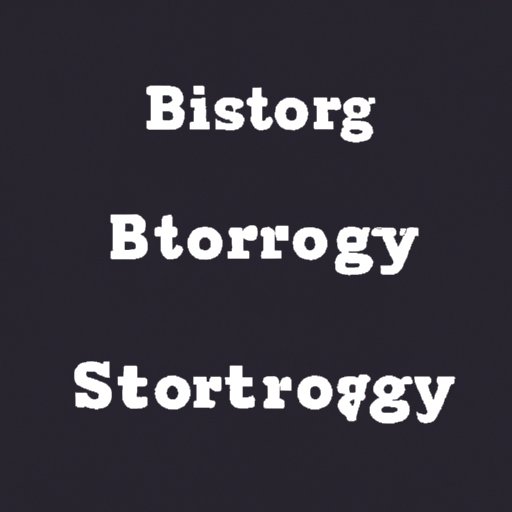Introduction
A biography is a written account of someone’s life. It includes details such as major events, accomplishments, and relationships that have shaped the person’s life. Writing a biography can be a rewarding experience – it allows you to dive into the life of a person and explore their story in greater detail. It also helps readers gain insight into a person’s life, motivations, and actions.
Capturing the Essence of the Subject
When starting a biography, it’s important to capture the essence of the subject. Think about the person’s life and experiences and what makes them unique. Consider the following questions: What are the most meaningful moments in the person’s life? What lessons did they learn along the way? What were their hopes and dreams? Answering these questions will help you get started on the right track.
Begin by starting with a question or thought. For example, “How did this person’s upbringing shape their life?” This gives you a starting point from which to explore the person’s life and experiences. As you write, illustrate key moments in the person’s life. Describe the people and events that had an impact on them.
Describing the Person’s Early Life and Upbringing
Once you’ve established the main theme of the biography, focus on describing the person’s early life and upbringing. Include details such as where they grew up, who their parents were, and any significant influences they had while growing up. Pay special attention to the person’s accomplishments, successes, and milestones. Highlight awards, honors, and recognition they received.
It’s also important to include quotes from people who know the person best. Quotes provide valuable insight into the person’s character and can be used to emphasize key points in the biography. Examples of appropriate quotes include friends, family members, colleagues, and other people who knew the person well.

Including Quotes from People Who Know the Person Best
When looking for quotes, it’s important to find appropriate sources. Reach out to people who knew the person and ask them for their thoughts. You can also search online for interviews, articles, and other sources that feature quotes from those who knew the person.
When selecting quotes, choose ones that are relevant to the biography. Avoid using quotes that are overly long or complex. Short, simple quotes are more effective and easier to understand.
Ending with a Summary of the Person’s Legacy and Impact
When ending a biography, it’s important to summarize the person’s legacy and impact. Focus on the person’s significant contributions and how they have impacted the world. Consider how their work has made a difference in the lives of others.
It’s also important to celebrate the person’s legacy. You can do this by organizing a memorial service or gathering, creating a website dedicated to their memory, or donating to a charity in their name.
Conclusion
Writing a biography can be an intimidating task. However, with the right approach, you can capture the essence of your subject and make the writing process easier. Start by asking yourself questions about the person’s life and experiences, then focus on describing their early life and upbringing. Include quotes from those who knew the person best and end with a summary of the person’s legacy and impact.
With dedication and hard work, you can create a beautiful biography that celebrates the person’s life and legacy. So don’t be afraid to start – you never know where the journey will take you!
(Note: Is this article not meeting your expectations? Do you have knowledge or insights to share? Unlock new opportunities and expand your reach by joining our authors team. Click Registration to join us and share your expertise with our readers.)
